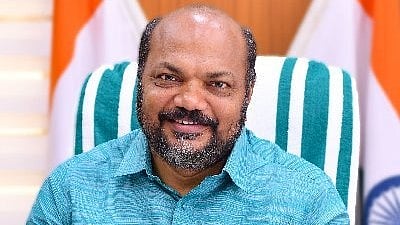
Kerala Minister P Rajeev.
Credit: X/@PRajeevOfficial
Kerala Minister for Law, Industries and Coir P Rajeev talks about the key initiatives being taken by the Pinarayi Vijayan-led left-front government for improving Kerala’s industrial ecosystem.
What is the status of the Kochi-Bengaluru industrial corridor?
Among the 12 new industrial cities announced by the Centre last year, only the Kochi-Bengaluru industrial corridor seems to have reached the tendering stage. The Rs 1,450-crore manufacturing smart city project on a 1,710-acre land in Palakkad will comprise state-of-the-art facilities to make the region a hub of modern industries like aerospace and food processing.
We are also in the process of getting the Centre’s support for setting up a global capability centre in Kochi as part of the corridor. Though the Centre initially proposed a global industrial finance and trade (GIFT) city, it later backtracked as a similar project was sanctioned for Gujarat.
What are your expectations for Vizhinjam International Seaport?
Kerala’s overall growth potential has drastically expanded with the commissioning of the Vizhinjam international seaport. Due to land scarcity and ecological issues, it is difficult for Kerala to have large production facilities. With the frequent arrivals of container ships, Kerala could possibly tap the opportunity to set up assembling facilities. Logistics is another key sector where Kerala could witness huge growth, as many international firms are already in the process of acquiring land for logistic parks.
How supportive is the Centre for Kerala’s industrial growth, especially being a non-BJP-ruled state?
Though the Centre is generally supportive of industrial and infrastructure development, vested interests also appear to be at play. The decision to shift the GIFT city proposed in Kochi to Gujarat and discrimination in channelling foreign investment proposals to non-BJP-ruled states are instances.
What were the key initiatives to boost industrial development?
While the state has made significant progress in various sectors, the Kerala model of development had many shortcomings. Our key focus was to address those shortcomings and ensure a good ecosystem. A key initiative was to understand the problems faced by the industry by directly interacting with investors, bringing successful entrepreneurs of Kerala to the boards of the state’s industrial promotion agencies and amending various rules that posed hurdles to the investors. We also took trade unions into confidence, and no major industry in Kerala faced any labour issues over the last few years. The recognitions received by the state for ease of doing business and the impressive response to the investors’ meet point to the success of our efforts. As part of the Year of Enterprise campaign, 3.5 lakh enterprises were started, and the state witnessed a 100% increase in FDI at Rs 3,300 crore.
Congress MP Shashi Tharoor initially hailed the industrial growth but later retracted by citing a high closure rate. What is the reality?
The mortality rate of MSMEs in the country is 30%; Kerala could bring it down to 10%, exceeding our target of 15%. A series of initiatives —like clinics to support MSMEs to address various issues they face in the initial stages—helped. We have also set up an effective system to monitor the investment proposals received at the investors’ meet, with daily reviews at officers’ level and monthly reviews at the chief minister’s level.
But unemployment in Kerala still remains high…
It is high time that the unemployment figures are properly vetted. For example, at a job fair in my constituency Kalamaserry, Kochi, while there were 3,500 job offers, only 1,550 applied, of which 350 were selected, and only around 200 joined. MSMEs in Kerala have generated 7.5 lakh jobs.
Kerala is also witnessing reverse migration in sectors like IT. Leading firms like EY, IBM and HCL have been making massive recruitments in Kerala over the last few years, and many of the employees there are from Kerala who were working in other states and countries.
Now our higher education institutions are also offering courses tailored to specific industries in the state. For instance, Cochin University of Science and Technology introduced an MTech programme in polymer science and rubber technology to cater to companies like Apollo Tyres.
Kerala-based Kitex Group is making fresh investments in Telangana and Andhra Pradesh. Its managing director, Sabu Jacob, openly flayed the adverse conditions in Kerala.
It is well-known that Kitex and its sister concerns have scripted success while functioning from Kerala. The political difference of Kitex Group MD is also well known. In 2012, he had announced that Kitex would leave Kerala. Hence, his statements won’t harm Kerala’s image. We are still open to extending support if Kitex wishes to invest in Kerala.
During the commissioning of Vizhinjam port, Prime Minister Narendra Modi pointed out the Communist government in Kerala terming Adani as ‘our partner’. Is the CPM undergoing an ideological shift?
It is not a shift but a development. The Communist Party used to raise slogans against Tata and Birla during the 1950s; it was the first Communist government that invited the Birla group to set up the Gwalior Rayons in Kerala. In the budget presented by then finance minister C Achutha Menon, there was even an allocation for the state government to take equities in private investments in Kerala as a confidence-building exercise. We are never opposed to private investments but only want to ensure responsible investment and responsible industry.
